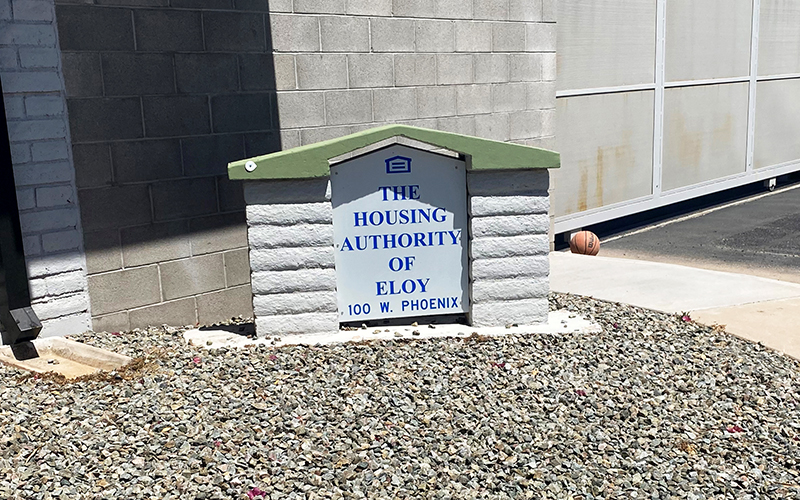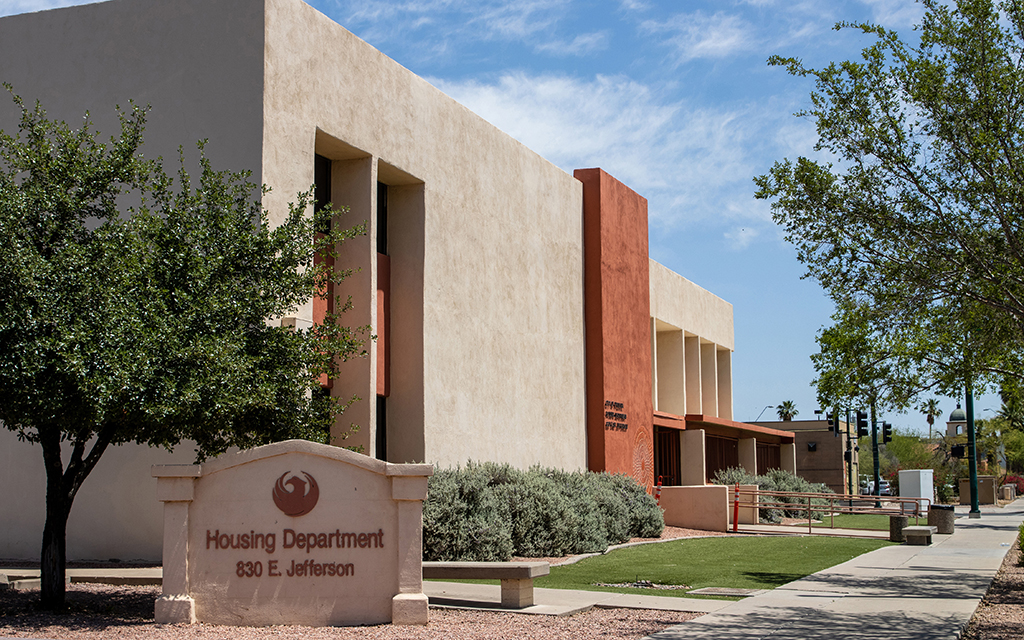
The office of the Eloy Housing Authority remains closed to the public because of the pandemic on April 12, 2022. (Photo by Isza Amponin Zerrudo/Howard Center for Investigative Journalism)
ELOY – One block west of Main Street, behind City Hall and police headquarters, sits a nondescript one-story gray-brick building that should be a lifeline for the thousands of local residents living below the poverty line.
But in the middle of a workday afternoon on a recent Tuesday, the door of the Eloy Housing Authority is locked and the office lights are out. After a knock and a short pause, a woman appears. She won’t speak to journalists but assures them the federal government has the subsidized housing policy and operations records they seek.
Then she closes and locks the door. A sign taped to the door says the office will be closed indefinitely.
At least two Arizona cities – Eloy and Williams – have outsourced to private companies their public housing authorities, which disburse federally funded housing assistance to low-income residents. Phoenix has outsourced the management of its Section 8 voucher program, a major initiative by the Department of Housing and Urban Development to help low-income residents rent privately owned properties.
But the only visible clue that Eloy’s authority is privately managed is a line of white text stenciled on the glass door: “Managed by Cindi Herrera and Associates.” It doesn’t note that the company is based in South Carolina.
Although privatization is one response to the rising cost of housing and insufficient federal funding, critics say it has shortcomings.
According to a 2019 study by Rachel Garshik Kleit at Ohio State University, who researches the social effects of affordable housing, the public-private approach to subsidized housing helps offset the costs of managing properties.
But property management is just one part of the challenge.
Housing is a scarce resource in high demand, Kleit said, which compels housing authorities to be selective in who receives subsidized housing.
“There’s a lot of judgment involved in housing,” she said in an interview. “It’s a question of choice.”
Lawrence Vale, the Ford Professor of Urban Design and Planning at the Massachusetts Institute of Technology, is particularly interested in how outsourcing public housing programs to the private sector supports the interests of low-income residents.
In his 2019 book “The Privatization of American Public Housing,” Vale found that privatization fell short of the demand for affordable housing and that private interests pushed out those most in need of housing.
“Even with all of these new programs that have been developed, it was a little bit of a surprise to sort of see that privatization has left the poorest of the poor behind,” he said in an interview.
History of problems
Eloy, a city of just more than 15,000, is in Pinal County about halfway between Phoenix and Tucson, the state’s two largest cities. Its population is predominantly Hispanic and, according to the most recent census data, 1 out of every 3 residents lives below the poverty line. The current fair-market rent for a one-bedroom unit in Pinal County is about $1,100 a month.
Like most other public housing authorities (PHAs), the Eloy authority is governed by a board of commissioners. Under HUD policy, the board works closely with city officials and the housing authority’s executive director, and the board has final say over legal and financial responsibilities.
“The authority to organize and discharge the PHA’s business is the sole responsibility of the PHA board and the function cannot be delegated,” according to HUD training material. “The board is also responsible for the performance of the PHA.”
From 2002 to 2007, Eloy Housing Authority failed HUD’s Public Housing Assessment System test and was rated as “troubled” because of its “zero score under the financial component.” HUD uses the four-part test, which includes an analysis of the financial condition of each public housing project within a housing authority, to assess how well housing authorities manage their public housing programs.
A 2008 HUD audit of the Eloy authority found serious violations. Joan S. Hobbs, the regional inspector general for audit, wrote that the authority’s board of commissioners “did not perform its fiduciary responsibility to provide effective oversight. As a result, more than $2 million in federal funds was placed at risk, and the authority incurred unnecessary costs and struggled to pay its operating expenses.”
Since 2010, according to its website, the Eloy Housing Authority has been managed by Cindi Herrera and Associates LLC, a South Carolina business that manages housing authorities across the country. As the Eloy Housing Authority’s governing body, board commissioners approved the partnership and signed that contract and all subsequent agreements with Cindi Herrera and Associates.
However, when asked for copies, the city said it didn’t have the contracts. Repeated efforts to reach Herrera and other company officials were unsuccessful.
As part of a series on some of the roadblocks to affordable housing in Arizona, the Howard Center for Investigative Journalism collected from housing authorities copies of their administrative plans, five-year plans and admissions and continued occupancy policies. Although each document serves a different purpose, taken together they serve as a comprehensive guide for how the housing authorities are managed and, importantly for potential applicants, who exactly is eligible for federal government housing assistance.
Two calls made to the Eloy Housing Authority in March requesting those documents were unsuccessful. During the April 12 visit to the office, a woman who answered the door and would identify herself only as Grace, said the documents had been sent to HUD and could be accessed there.
A woman answering the phone at the authority two days later, who would not give her name, said she had never heard of the documents nor had any interaction with Cindi Herrera and Associates.
On April 14, the Howard Center filed a public records request with the city, requesting copies of contracts executed through April 2022 between Eloy and Cindi Herrera and Associates. In an email response, a spokesperson said the city did not have “anything pertaining” to the request.
Trina Gaston, the city’s administrative assistant, later said Eloy did not have copies of the contracts because the housing authority is run by HUD. However, the Eloy Housing Authority is run by its board of commissioners.
The authority’s five year-plan eventually was provided via email by HUD’s national office in Washington, D.C. The Eloy Housing Authority still has not provided its administrative plan or admissions and continued occupancy policy.
Micah Powell, Eloy’s mayor and chairman of the housing authority’s board, declined to be interviewed on advice of legal counsel. Powell joined the City Council in 2012, when the housing authority still was reeling from the 2008 HUD audit.
The board’s commissioners are not listed on the authority’s website, where other authorities’ most important information usually appears. The website includes scant information about Cindi Herrera, the president-principal of Cindi Herrera and Associates who advertises more than 40 years of experience in the affordable housing industry.
But it does mention Emmally Mercer, who’s identified as Eloy Housing Authority’s director of operations. Mercer, who’s based in Covington, Kentucky, says she has more than 30 years of experience in the affordable housing industry.
In a post on her LinkedIn page, Mercer wrote: “The Eloy Houding (sic) Authority held the destinction (sic) of being the longest standing HA in default with HUD in the history of affordable housing. The HA was in default for over 10 years. We became a standard performer within one year of assuming management and have been high performer every year since.”
Mercer also is director of operations for the Elkton Housing Authority in Maryland, which is overseen by Cindi Herrera and Associates.
Neither Herrera nor Mercer could be reached for comment at Eloy Housing Authority’s phone number. An interview request sent to the email address listed for Herrera on the housing authority’s website was returned with the note “There is no mailbox by that name.” A request sent to her Columbia Housing Authority address was blocked, and she did not respond to an interview request sent to her personal email. Mercer also did not respond to requests for interviews sent to her Eloy Housing Authority email address.
Williams also goes private
In Williams, a small town of 3,200 in northern Arizona’s pine country, the City Council has hired a private company to run its housing authority.
Jeff Dollins, an attorney for the Williams Housing Authority, said in an April 7 email to the Howard Center that the authority did not have its five-year plan or current administrative plan on file.
In a Feb. 24 email, Debbie Fuller, the former director of the Williams Housing Authority, wrote that she was called back in by the mayor to “get things back on track.” She went on to write that the housing authority was in the process of looking for a management company to take over and was “still in the process of putting out fires.”
Dollins told the Howard Center on April 7 that a new management company had been chosen – Cindi Herrera and Associates.
In response to the Howard Center’s requests for details about the bidding process and the newly signed contracts, the Williams Housing Authority responded that HUD directed it to “only answer questions under written requests” and to forward them to the authority’s attorney.
Howard Center reporters complied but did not receive answers.
The Williams Housing Authority has no website for residents to learn about eligibility requirements and how to obtain assistance.
In contrast, the Phoenix Housing Department publishes the required documents on its website. It also differs from Eloy and Williams in that it has outsourced just its Section 8 housing voucher program, not its entire public housing management, to Quadel, a national affordable housing industry consulting firm.
The Section 8 program issues vouchers that tenants with low incomes can use to rent from private landlords. Tenants are responsible for paying at least 30% of their monthly income toward rent and utilities, with the vouchers covering the rest.
Quadel began managing the program in 2018 under a contract worth an estimated $3 million over five years, with options to renew for up to five years.
Details of Phoenix’s relationship with Quadel can be found on the housing authority’s website, along with contact email addresses, phone numbers, links to the authority’s administrative and five-year plans, program resources and other information prospective tenants can use.
“We run the day-to-day and put it all together,” said Andre Serrette, Quadel’s managing director for Phoenix’s Section 8 program. “But ultimately, it is a partnership with the city of Phoenix. So we are working hand-in-hand in terms of reporting back to HUD on what’s going on with the program.”
There is no right way to approach private management, Serrette said.
“There’s no cookie cutter template where ‘You guys have to do it this way, and A, B and C, D.’ Each one you’ll probably see is different,” he said.
If you or someone you know is facing housing discrimination or believe your rights have been violated, you can file a complaint by calling HUD at 1-800-669-977 or visiting the How to File a Complaint page on HUD’s website. You can also contact a fair housing organization in your area.
This story was produced for the Howard Center for Investigative Journalism at Arizona State University’s Walter Cronkite School of Journalism and Mass Communication, an initiative of the Scripps Howard Foundation in honor of the late news industry executive and pioneer Roy W. Howard. Contact us at [email protected], visit us on Twitter @HowardCenterASU.

